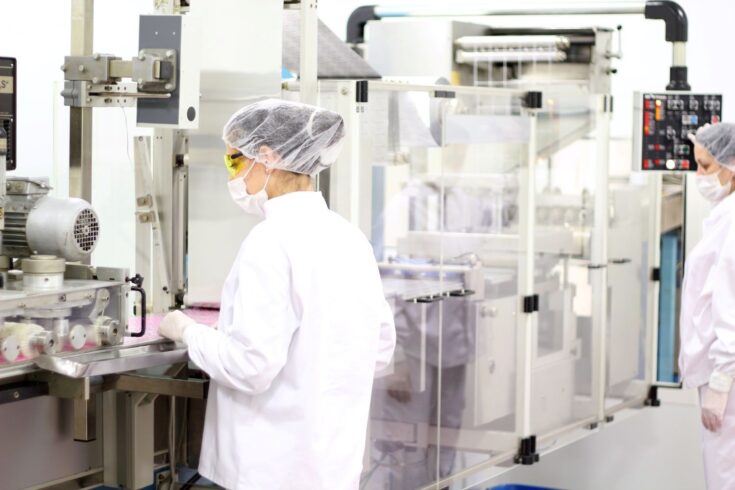If the pandemic has any silver linings, one must surely be that the public now recognises the importance of medicines manufacturing. Over the last 2 years the unsung heroes of UK medicines production have been in the news.
Rapid vaccine and drug development have been a national concern and not just something that keeps heads of development awake at night! I wanted to know what kind of government support would be welcomed by the contract development and manufacturing organisations (CDMOs). Here’s why.
Transforming Medicines Manufacturing
I work for the ‘Transforming Medicines Manufacturing’ team at UK Research and Innovation. Our job is to support the whole of the medicines manufacturing community in the UK. We have to make good use of public funding and we are subject to independent review.
During 2021 the reviewers asked us to show how we support the contract manufacturers. Our relationship with the CDMOs has often been driven by their applications for grant funding; it was time to be more proactive.
We decided to find out whether there is anything different that we could be doing to help CDMOs and to understand their recent experience of working in the UK. We interviewed a sample of companies, concentrating on the ones offering a range of services. Companies specialising in just 1 or 2 would be less likely to experience the full range of market influences (hence the emphasis on CDMOs rather than CMOs).
Innovation is a risky business
The modern pharmaceutical industry has a large proportion of micro, small and medium size companies working to commercialise inventions, many of which start in academia. These companies have a risky decision to make when they scale up. Heavy investment is needed to acquire the manufacturing capacity, investment that may not be recovered if the innovation is unsuccessful.
Most take the decision to contract work out. So, it is hardly a surprise that the contract manufacturing sector has been growing in importance recently.
12 structured interviews (11 CDMOs and 1 industry expert) explored factors such as:
- the UK business environment
- access to skills and expertise
- level of understanding of government incentives
- what the organisation needs for innovation to flourish

Credit: imaginima, E+ via Getty Images
Geographical data
Manufacturing sites tend to have been either established by one of the larger pharma companies and subsequently sold off or developed as new facilities close to regional scientific universities. The businesses in our survey are well spread across the UK. Site locations in Scotland, the north and south of England and the Midlands were represented. Overseas branches of some of the companies can be found in the US, the EU, Switzerland, India and Japan.
Most interviewees offer manufacturing capability at both clinical and commercial scales. The ones that offer only clinical trial manufacturing tend to partner with other CDMOs to support commercial manufacturing.
We found that the UK CDMO sector is broadly in good shape. Here I report on recruitment. Insights into the other factors will follow in a second blog shortly.
Recruitment issues
Some said that it is straightforward to recruit at the technician level but challenging to recruit senior scientists. At first, we believed this was because scientists and engineers from the ‘golden triangle’ (defined by Cambridge-London-Oxford) may be less willing to move around the UK. The results were more nuanced though: some companies in the same region outside the golden triangle reported that good technicians were the most difficult to recruit.

Credit: gorodenkoff, iStock, Getty Images Plus via Getty Images
Advanced therapy manufacturing training
Since 2018, Innovate UK has been funding professional training in advanced therapy manufacturing via the Advanced Therapy Apprenticeship Community and the Advanced Therapy Skills Training Network. The apprenticeship scheme has been very well received by industry and feedback in the CDMO interviews recognised this as a model that would be welcome in wider medicines manufacturing subjects.
The trade press for the pharma industry has commented on the growing importance of long-term business relationships in contract services. Our contacts said that specialist manufacturing capabilities can be a major selling point, but the personal relationship between the inventor and the manufacturing team at the CDMO is equally important.
Personal recommendation seems to be key for CDMO selection. Larger CDMOs are at risk of losing business if they select their site for manufacture based solely on their own scheduling rather than customer preferences.
A key consideration for some customers when selecting a CDMO is the continuity of site management and retention of experienced personnel (and hence manufacturing knowledge), who in many cases are known to the customer. This places an emphasis on the need for providing a UK base of well-trained technical staff and a business environment that encourages them to remain in the UK.
Insights
We are grateful for the creative and helpful insights from the CDMO interviewees. These have given us food for thought, either for this round or for the future.
Keep an eye on the Innovate UK funding pages and the grant round-up news from Innovate UK KTN for further developments.
Further information
Connect with Nick on LinkedIn
Follow Innovate UK on Twitter
Connect with Innovate UK on LinkedIn
Follow Innovate UK on Facebook
You can go to the new Innovate UK website
You can go to the Innovate UK EDGE website
Subscribe to our YouTube channel
Sign up for our email newsletter




